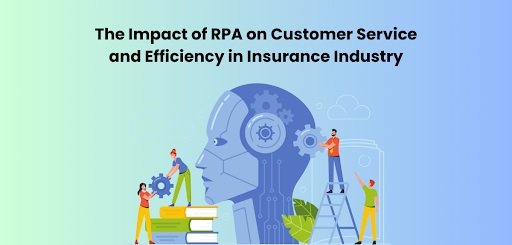Robotic Process Automation (RPA) is a technique that automates rule-based, repetitive operations in the context of business processes using software robots, or “bots.” This blog post will look at the significant influence of RPA on customer service and operational efficiency in the insurance industry. RPA in Insurance sector facilitates seamless task execution by automating repetitive processes, allowing employees to focus on more complex and value-added tasks. Additionally, the deployment of Robotic Process Automation streamlines operational workflows and enhances data accuracy and compliance within insurance operations, ensuring a more robust and error-free customer service experience.
Table of Contents
- Streamlining Operations with RPA in Insurance
- Elevating Customer Service through RPA in Insurance
- Conclusion
Streamlining Operations with RPA in Insurance
Enhanced Claims Processing
The automation of rule-based operations using RPA is very useful in the claims processing industry. Insurance firms frequently struggle with a large amount of tedious data input and validation work. By automating these tedious tasks, RPA saves time and reduces errors while expediting the processing of claims. Faster settlements for policyholders lead to greater levels of satisfaction.
Accelerated Underwriting Processes
Underwriting in the insurance business entails estimating policy premiums and evaluating risks. RPA automates risk assessment, data extraction, and analysis, simplifying this intricate procedure. Underwriters can concentrate on more strategic areas of decision-making. As a result, RPA guarantees accuracy and efficiency while managing high volumes of underwriting assignments. This improves the overall risk assessment accuracy and the fastest underwriting process.
Efficient Policy Administration
In policy administration, time-consuming routine procedures such as policy updates, renewals, and document verification can be done with the help of RPA. By utilising RPA for automation, insurance professionals can focus on more complex areas of policy management while lowering the possibility of errors in these administrative tasks. As a result, the policy administration system is more responsive and nimbler.
Enhanced Compliance and Reporting
In the insurance industry, RPA is essential for guaranteeing regulatory compliance and streamlining reporting duties. The risk of non-compliance can be decreased by automation, which can automatically update policies, generate compliance reports, and methodically track regulation changes. RPA streamlines these procedures, which improves compliance management’s effectiveness and gives insurers an auditable, dependable trail—a requirement for adhering to regulatory requirements. In addition to reducing risks, this proactive approach to compliance strengthens insurance companies’ overall operational resilience.
Elevating Customer Service through RPA in Insurance
Personalised Customer Interactions
Large-scale customer data is consolidated and analysed using RPA to enable personalised customer interactions. Customer support agents may spend more time on answering complex questions and offering customised solutions by automating regular inquiries and updates. As a result, clients receive more effective and individualised customer care, which increases client loyalty.
Prompt and Accurate Responses
All consumers expect quick responses, and RPA is there to deliver on this need. Routine client interactions, insurance updates, and claims status inquiries can all be handled accurately and quickly with automation. In a competitive world, this raises customer happiness and helps insurance businesses position themselves as responsive, customer-focused organisations.
Improved Communication Channels
Email, chat, and social media are just a few communication avenues with which RPA easily connects. Through this interface, insurance companies may interact with clients on several channels, automating answers to commonly asked queries and guaranteeing a steady and prompt flow of data. These improved avenues of communication can strengthen the company’s dedication to transparency and improve the customer experience.
Enhanced Claims Processing
Robotic process automation greatly accelerates the processing of insurance claims by automating the processes of documentation verification, assessment, and approval. This ensures a more accurate and efficient resolution for policyholders by minimising errors and speeding up the claim’s lifecycle overall. Accurate and prompt claim processing improves client happiness and strengthens the insurer’s reputation for dependability.
Conclusion
RPA significantly improves insurance operations and customer service. Exploring Advanced Technology Courses is crucial for professionals aiming to leverage these advancements. RPA is a crucial facilitator for the insurance industry’s ongoing digital transformation, helping to achieve favourable results for both insurance companies and their cherished clients.

